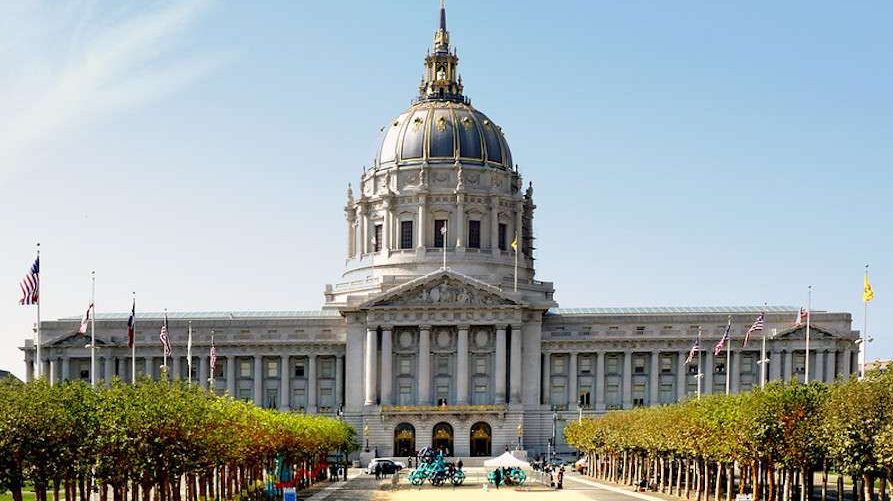The Archbishop of San Francisco has called Catholics to participate in Eucharistic processions across the city Sept. 20, which will join together and walk past city hall before public Masses are said outside the city's cathedral - in part to protest the city’s revised limits on public worship.
Archbishop Salvatore Cordileone said in a memo to priests Sept. 13 that separate processions would begin at St. Anthony, St. Patrick, and Star of the Sea parishes, and would converge at United Nations Plaza near San Francisco City Hall.
The combined processions will then proceed past city hall to the Cathedral of St. Mary of the Assumption, where San Francisco priests, led by the archbishop, will celebrate multiple outdoor, socially-distanced Masses in both English and Spanish.
San Francisco Mayor London Breed had announced this week that starting Sept. 14, houses of worship may have 50 people at religious services outdoors. In addition, indoor private prayer is allowed, but only one person at a time is allowed inside.
Previously, the limit for outdoor services had been 12 people, with all indoor services prohibited. The archdiocese covers the city and county of San Francisco— where the cathedral is located— as well as San Mateo and Marin counties.
In contrast, hotels in San Francisco are fully reopened; indoor gyms are set to reopen at 10% capacity; and most retail stores are allowed to operate at 50% capacity, while malls are restricted to 25%. Gyms operated in government buildings for police officers and other government employees have already reopened.
In addition, Archbishop Cordileone has noted, businesses requiring extended, close one-on-one contact will also be reopening Sept. 14, such as hair salons, nail salons and massage parlors, but “we are allowed only one person in church at a time for prayer.”
While San Francisco Catholics have been gathering outside for Masses, unable to gather inside their churches, the Bay Area is experiencing some of the worst air quality in the world, because of smoke and other pollutants coming from wildfires ravaging the West Coast. Air quality is expected to improve some this week, but worsen over the weekend, as smoke is pushed toward the city by coastal winds.
Cordileone said the archdiocese has ordered 100 banners in English, 15 in Spanish, and 5 in Chinese that read: “We Are Essential: Free the Mass!” He asked that parishioners carry the banners during the Eucharistic processions.
The archbishop has noted that the state’s legitimate concern for health and safety does have some bearing on how the Church operates— for example, there are good reasons why church buildings must be built with respect to code.
“But the state does not tell the Church how to arrange the liturgical space—that pertains to the internal life of the Church, over which the state has no authority. The same principle applies to worship services: the state has no right whatsoever to tell the Church it cannot worship, but it has every right and responsibility to tell the Church which practices it must observe to keep people safe during worship,” Cordileone told CNA Sept. 4.
Cordileone said priests at many parishes around the archdiocese, including the Cathedral of St. Mary of the Assumption, are celebrating multiple Masses every Sunday— outside, and spaced out— in order to adapt to the restrictions.
“The Body and Blood of Christ is the source and summit of our Faith. People are hungry for the Eucharist, and many priests are responding to the call as best they can,” he said.
The City of San Francisco has been closely monitoring Catholic churches in the city and has repeatedly issued warnings to the archdiocese for apparent health order violations.
Cordileone said he himself has noted “very few” violations of the city’s health orders by parishes in the archdiocese, although the few that have occurred have garnered heavy criticism in the secular press.
While Cordileone said city officials have been “cordial and respectful” in their dialogue with the archdiocese, he added that the city still has not responded to the archdiocese’s safety plan— outlining how churches could be safely opened for indoor services— which they submitted in May.
In advocating for a safe reopening of indoor Masses, Cordileone has cited a recent article on Mass attendance and COVID-19, authored Aug. 19 by doctors Thomas McGovern, Deacon Timothy Flanigan, and Paul Cieslak for Real Clear Science.
By following public health guidelines, Catholic Churches have largely avoided viral spread during the more than 1 million Masses that have been celebrated across the United States since the lifting of shelter-in-place orders, the doctors found.
They said in their article that there is no evidence that church services are higher risk than similar activities when guidelines are followed, and no coronavirus outbreaks have not yet been linked to the celebration of the Mass.
Even while protesting the city’s apparent unequal application of health restrictions, the archbishop has encouraged his priests to lead their parishes in following the city’s guidelines.
The Benedict XVI Institute for Sacred Music and Divine Worship, which provides liturgical resources in the archdiocese, shared a petition Aug. 31 in support of Cordileone’s statement calling for the lifting of restrictions on the Mass. To date more than 3,500 people have signed.
A Pentecostal church challenged California’s church service limits earlier this year, arguing that houses of worship were being unfairly treated in a more strict manner than other secular venues, including restaurants, hair salons, and retail stores.
In May, the Supreme Court sided with the state of California. In a 5-4 decision, Chief Justice John Roberts argued that the court lacks the expertise and authority to second guess the decisions of elected officials in the context of public health decisions during a pandemic.
In several other states, churches have successfully challenged restrictions against houses of worship, on the grounds that public officials were not able to justify the decision to treat them more strictly than other secular gathering venues.

